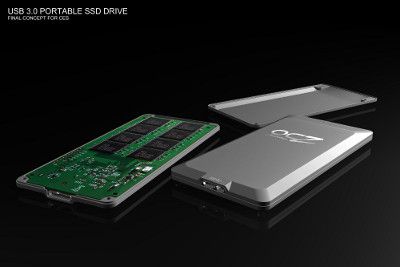- Qualcomm Launches Snapdragon 4 Gen 2 Mobile Platform
- AMD Launches Ryzen PRO 7000 Series Mobile & Desktop Platform
- Intel Launches Sleek Single-Slot Arc Pro A60 Workstation Graphics Card
- NVIDIA Announces Latest Ada Lovelace Additions: GeForce RTX 4060 Ti & RTX 4060
- Maxon Redshift With AMD Radeon GPU Rendering Support Now Available
OCZ Teases Portable USB 3.0 Solid-State Drive
As I have mentioned in our news a couple of times over the past week, USB 3.0 is a fast-growing technology, and the vast number of equipped products either on the show floor or in one of the many hotel suites around Vegas proved to me that we should all be expecting a quick upswing of adoption in the months to come.
USB 3.0 can be used for many things, but most commonly it will be used for storage devices, at least right now. These could include external enclosures where you throw your own hard drive inside, external enclosures that have a fixed amount of storage straight from the vendor, flash drives, and also SSDs. Yes… SSDs via USB, with no AC adapter requirement.
This in particular is the kind of USB 3.0 product I’m looking forward to being able to test out in the near-future, because the idea of being able to carry around 100GB+ in my pocket and be able to plug it into any USB 3.0 port and get speeds similar to a regular hard drive excites me. Of little surprise, OCZ is soon to release such a drive.
The product isn’t named yet, so for now the company is calling it “USB 3.0 Portable Solid State Drive”. Under its hood is a Symwave controller and MLC chips, similar to those used in current consumer SSDs. When plugged into the PC, you will see speeds of well over 100MB/s in both directions. I am not sure of the exact figures, because I forgot to photograph the monitor. But either way, it was fast?. At the speeds I saw, it will outpace most mechanical hard drives.
Need some real performance details? OCZ says that with a typical USB 2.0 drive, a Blu-ray movie (25GB) could be copied in 13.9 minutes. With its USB 3.0 drive, that time drops to 70 seconds. Likewise, for a 1TB backup (this is theoretical since these things won’t see that kind of density for quite a while), USB 2.0 would take 9.7 hours, while the USB 3.0 drive could finish the transfer in 47 minutes.
Because the drive uses MLC, which is higher quality than most other flash NAND, speed degradation shouldn’t be as noticeable, so copying a huge folder wouldn’t lose its copying speed during the process, which is far different than how it is on a mechanical hard drive. You can expect to see OCZ’s portable drive sometime this spring, with pricing to be decided then.
|
Discuss: Comment Thread
|





